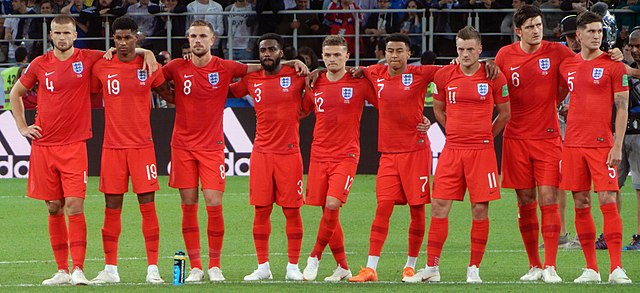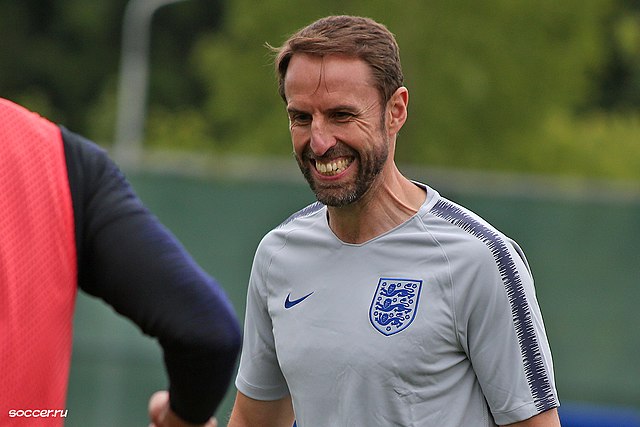The Psychology of Penalty Shootouts

Image: Oleg Bkhambri via Wikimedia Commons
After another disappointing loss on penalties for England, Stanley Murphy-Johns takes a closer look at the psychology behind penalty shootouts.
There are some who would argue that penalty shootouts could be likened to flipping a coin at the end of an intense 120 minutes of competitive football, but if this was true, why do England lose them so horrifically often? In reality, the science and the testimony of players suggests that ‘luck’ has very little to do with a penalty shootout, so in this article, I intend to examine both the reasons why a penalty shootout is not a matter of chance and the methods suggested by experts on how players can improve their conversion rates.
I can see why people often claim that penalty shootouts revolve around luck and to some extent they certainly do; the wind could move the ball on to the post just as it was heading for the net, a small fly could buzz by a player’s ear just as they began their run up or a goalkeeper could simply be having a good day. However, other than the factors outside of the players’ control, there is also a significant degree of skill and mental resilience which determine the result of a penalty shootout.
According to Dr Greg Wood, a senior lecturer at Manchester Met, anxiety can affect the performance of a player by impairing their visual focus.
When players were anxious, ‘they have this anxiety-induced attention bias towards the goalkeeper, and because they’re looking there, they will more likely hit it there.’
In addition to this, an earlier study found that of Europe’s eight most decorated teams, England had the highest goalkeeper-based focus, so that’s not great news. Putting England’s penalty misfortune aside for a moment though, one thing that is clear is that the more anxious a player is, the less likely they are to score.
This brings me to an article published by the British Psychological Society in preparation for the 2018 World Cup which presented methods through which a penalty taker could manage their emotions and give themselves the best possible chance of scoring. It concluded with the following advice; ‘By taking a little longer, controlling physiological responses by deep breathing, focusing on the goal, exposing themselves to positive words and celebrating, it’s possible that England can turn around their penalty shootout woes this summer.’ In fact, that article was correct, the England Men’s team beat Columbia on penalties in the Round of 16 to end a run of penalty shootout losses spanning from 1996.

Image: Кирилл Венедиктов via Wikimedia Commons
It has been widely reported that Gareth Southgate has installed a calmness within the English camp which had been missing for a long time, and perhaps this extra shelter from the media and the belief that Southgate instilled in his players reduced the anxiety going into that 2018 shootout. That being said, despite any anxiety Southgate could alleviate, I doubt any player would ever be prepared for a shootout in the final of a major international competition. One kick and you push your side one step closer to a momentous victory, one kick and you are immortalised in football legend, one kick and in the words of Sir Geoff Hurst ‘your life will change forever’. So no pressure.
Now, at the beginning of the article, I referred to people who liken shootouts to a coin toss, but it is important to note that there is a literal coin toss at the beginning of a penalty shootout to decide who takes first, and which ‘end’ of the stadium they shoot in. I mention this because Professor Igacia Palacios-Huerta of the London School of Economics analysed 1,343 penalty kicks from 129 penalty shoot-outs and found that the team that started first won 60.5% of them. I would argue that this supports the theory that anxiety is the most prevalent force in a penalty shootout because there is more expectation on the player who has to follow a goal from the opposition than there is for the player who has a blank slate. Therefore, the second player has another level of nervousness in addition to scoring the penalty itself. This, incidentally, also ties into my theory about the reason for England’s penalty misfortune. If we are to accept that anxiety is a significant factor in deciding a penalty shootout, then the obvious next step is to study the reasons why the players are feeling anxious.
There’s a crowd of thousands screaming all around you, you don’t want to let your team down, you don’t want to embarrass yourself, you want to make your nation proud. In England I would argue there’s an extra level of pressure placed on our players by both media and fans probably best exemplified by the phrase ‘it’s coming home’.
If you are to win a tournament for England, not only are you bringing home a trophy and a lot of happy memories, you’re bringing home the sport itself
There’s something expectant amongst English supporters, as though in these 55 interim years we’ve been wronged, and us winning would be returning us to our rightful place. If you add all that on top of the anxiety a penalty shootout is already causing, it’s a wonder we ever score a penalty.
I would like to end on a slightly different note, whether you believe that a penalty shootout is luck, or whether you believe that it’s a deeply scientific undertaking, it’s just football. It’s thankfully been said many times over the last couple of weeks, but I would be remise to not mention the disgraceful nature of ‘so-called fans’ who would racially abuse the players who missed the penalties in the final. Rashford, Sancho and Saka stepped up in a moment where many players wouldn’t have, they chose to put themselves through the huge anxiety this article has discussed and to think that some people decided to abuse them for it is utterly abhorrent.


